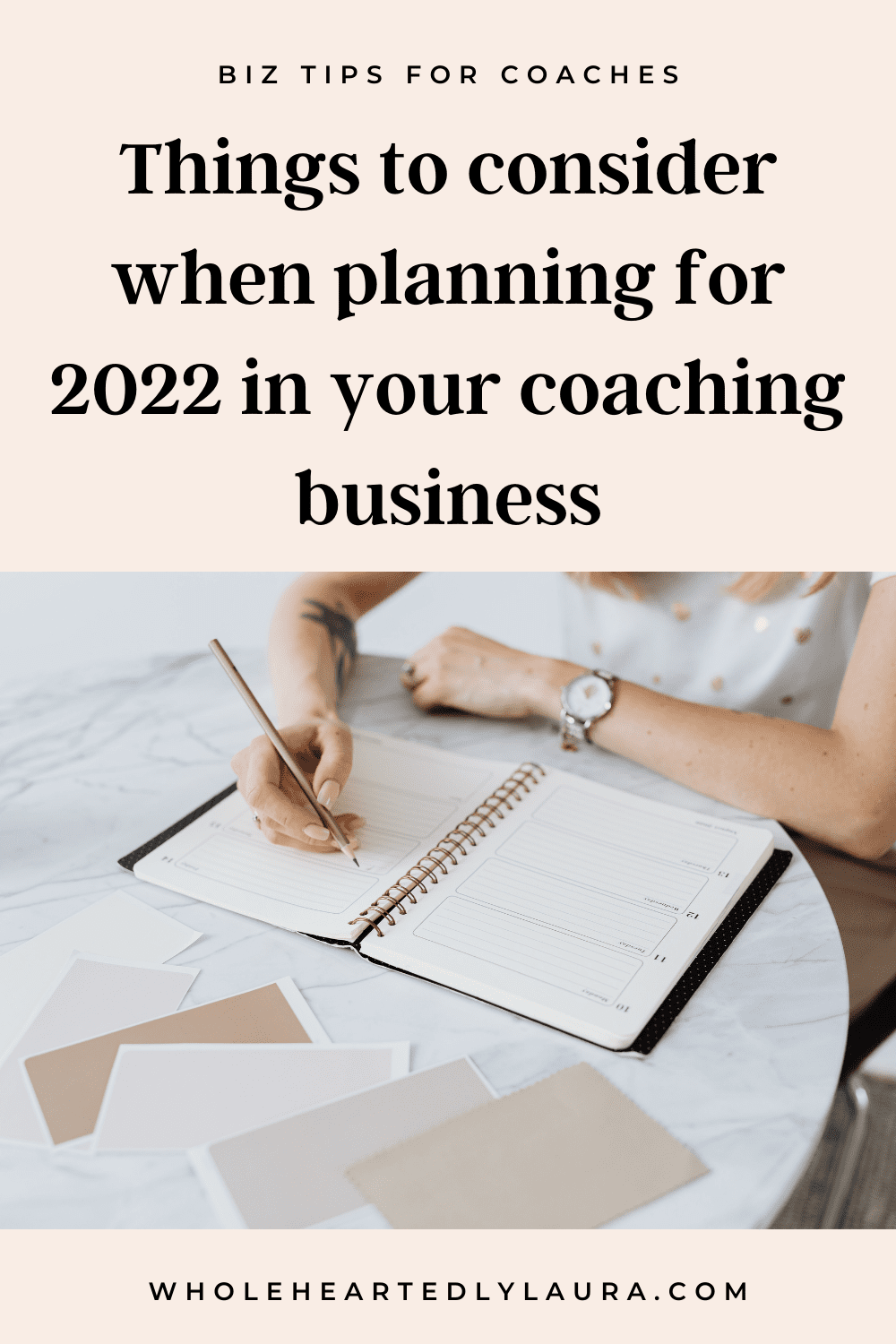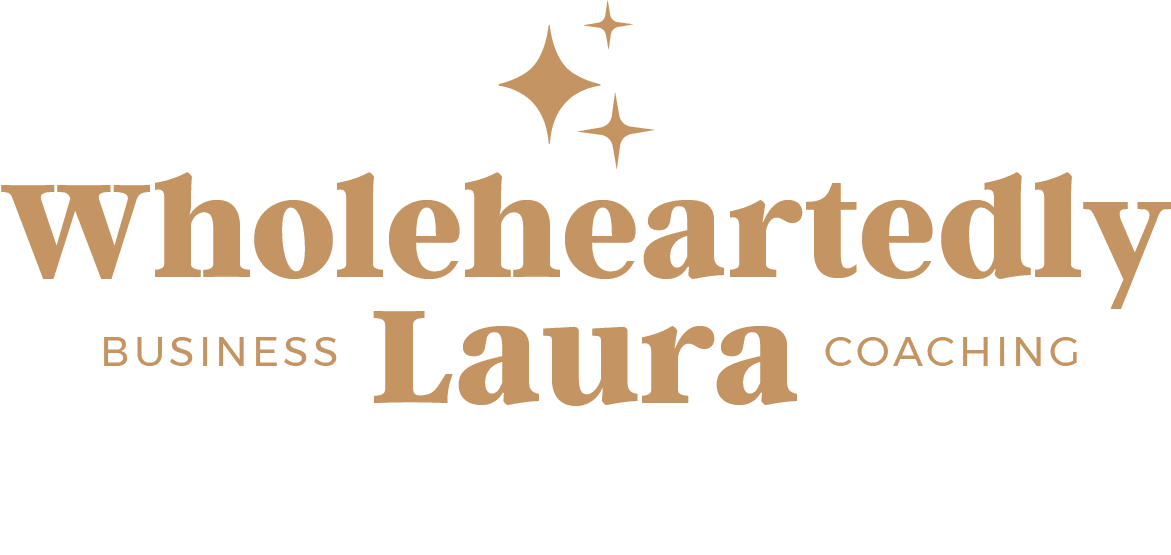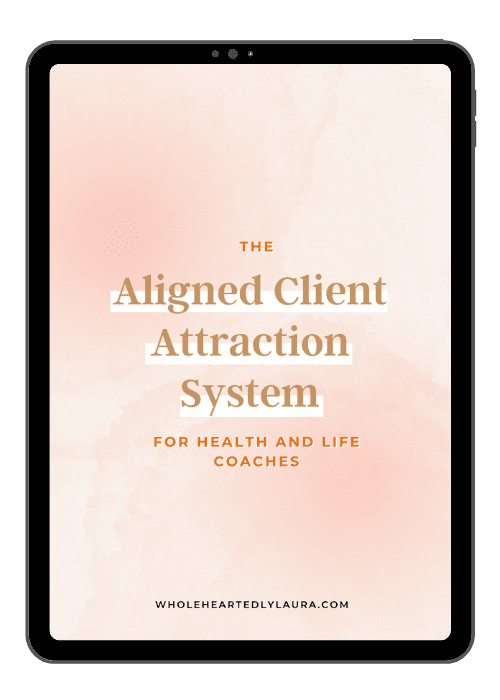Welcome! Today we’re going to be talking all about planning for your business in 2022. If you’re anything like me, as we get towards the end of the year, my brain starts to look ahead to the coming year. I begin thinking about what I want to focus on, what I want to achieve and how I want to show up.
In this post I’m going to share a few tips and things you might want to consider when it comes to planning for your coaching business in 2022.
Watch this episode on YouTube and subscribe to my channel here
Listen to this episode on The Wholehearted Business Show Podcast
Listen on Apple Podcasts / Listen on Spotify
Have a plan but hold it lightly
So I find the whole planning thing very motivating and inspiring – if you don’t that’s totally fine and feel free to skip this! I know it’s not everyone’s thing and that’s totally ok.
What tends to happen, certainly at the start of January, is that people can fall into one of two camps. You get people who totally shit on planning and New Years Resolutions or anything ‘new year new you’. And then you’ve got people who are well into it. I’m kind of somewhere in between those two sides, I love planning, but I know it has its limits.
My version of planning is one which appreciates the fact that all sorts of stuff can happen. If we’ve learned anything over the last two years, we know that the shit can hit the fan and things can change very, very quickly!
My approach to planning is basically about planning for the outcomes that I want based on things like my personal values, my core desired feelings and my version of success.
I believe that when you plan, you give yourself the best opportunity to achieve those things. The example I like to use around planning and how to ‘hold your plan lightly’ is around having a birth plan. When I was pregnant with my daughter, I planned to have a home birth, but for various reasons that didn’t work out. However, if I hadn’t actively planned for a home birth it would have been highly unlikely to happen at all. As I approached the whole thing knowing that so many things could impact my plan, I wasn’t devastated that it didn’t work out and I still had a really good birth experience.
This is how I view planning for all aspects of life and business now, if we don’t put plans in place we aren’t giving ourselves the best opportunity to actually get the things we want. We can plan for what we want to happen and also simultaneously hold the appreciation that we can’t control everything.
Another element of holding a plan lightly is that when you approach planning in this way you’re leaving space for a bit of magic, for being taken on an unexpected journey and all of that woo stuff!
The foundations of planning
Where you start with planning in your business might depend on where you’re at in your business journey and in what ways you’ve planned before.
Perhaps you really need to get into the ‘foundations’ which for me is asking yourself questions like:
- What kind of work do you enjoy doing?
- What’s your zone of genius?
- What’s your version of success?
These things feel quite fundamental to me and are a part of getting to know who you are and what you want. I feel like it’s quite hard to set meaningful and effective goals / intentions without that understanding to inform them.
Related post: How to Plan for Your Business.
Core Desired Feelings
This year I had a mini epiphany around recognising that the foundations were actually there in that the answers to those questions above hadn’t actually changed that much. I reflected on an exercise I did a few years ago – The Desire Map from Danielle LaPorte.
The basic premise of the book is that when we set goals or intentions what we’re really going after is a feeling. So if we had a goal to make more money, what’s the feeling that having more money is going to create? For example, safety, abundance etc. Once we’ve identified our Core Desired Feelings we can start and look at goal setting in a different way because ultimately it’s about creating more of those core desired feelings.
Mine are Creativity, Cosiness, Connection (to myself, to others and to nature).
If you aren’t sure what your core desired feelings are, I’d definitely recommend you take a look at the book and perhaps explore that because I feel like these things can have a big impact on how you then go on to plan for your business, which brings me nicely on to my next point!
Plan as a whole person
I plan for my business and life together, I’m a whole person and I plan as a whole person. Understanding how business and life flow and intertwine, and how my core desired feelings come into my business means that I personally approach planning as one thing.
I know some people prefer to keep life and business more separate, but I believe that when we’re running online coaching businesses most of us have a lifestyle element to that – i.e. one of the reasons why we’ve decided to run a business like this is for it to have a positive impact on our lives overall. So for me it just makes sense to look at it all together!
When I plan, especially for a new year I do make a ‘thing’ out of it – kind of a ritual. I will block it out in my calendar in December and have candles and something nice to eat and drink. I’ll sit down with notepads and tarot cards and all sorts of shit and I will plan and it is glorious!
Setting goals and intentions
So as I said, I feel like setting goals and intentions are so much easier and more effective when you have a foundation in place in terms of understanding who you are and what you really want.
When it comes to business goals / intentions I always have an income goal that I want to achieve, but it’s not always necessary or helpful. It really depends on you and your business, but I think it’s good to also consider other ‘metrics’ like how many people are on your list or what traffic are you getting to your website or how many followers you have on Instagram.
These can be helpful indicators of growth, so depending on what your goals are it can be useful to look at how you can measure your progress towards them.
Once you have some goals and intentions you can look at the year ahead and map them into quarters, or whatever way you like to break up chunks of time.
I get rather annoyed at Q3 not aligning with the start of September so I just plan however feels good, something I’m playing with at the moment is the Pagan Wheel of the Year so the solstices and equinoxes and cross-quarter festivals which are roughly 6 week periods.
Something I will always have is a monthly focus to keep me on track, perhaps it’s launching a specific offer or focusing on getting a certain number of clients but there’s always one or two things that I will write in my planner to keep me moving forward each month.
Projects or ongoing
Another thing I find useful is identifying what things are projects and what things are ongoing. For example, starting and setting up The Wholehearted Business Show was a project because things like getting the podcast feed sorted and my YouTube channel set up was a task with a start and finish, however keeping The Wholehearted Business Show going is an ongoing thing.
Knowing what I have as projects and ongoing things helps me manage my time and get shit done which ultimately helps me achieve my intentions!
Take action
Something I’ve found really helpful for my own planning is making it action focused. It’s all well and good having a beautiful planning ritual but for me to make stuff happen it all has to be backed up by actual actions that I take.
For each goal or intention I’ll write out a list of actions I need to take to make it happen, and then I’ll add those actions as tasks in my digital planner which I have in Notion.
Using organisational tools
I’m a massive fan of Notion which helps me stay organised and focused. Honestly I’m a little bit in love with it!
It can take people a little while to get their heads around but when it clicked for me it was such a game changer. I literally organise my entire life on there.
Whether it’s Notion or something else, having a system or a tool that helps you manage your actions and be organised is going to really help.
I think what’s really important is to find a system that works for you. A big part of my whole business philosophy is you don’t have to fight against your natural way of being, if you’re not a natural planner or organiser that’s ok, just find something that works for you that gets you the minimum result you need to get out of it.
In my programme Soul Centred Planning Process I share a bunch of templates to help you plan and stay organised in your business, as well as a recording of a planning session I held last year which you can rewatch and work through that’s really good for some of the foundational stuff. I’m also going to be adding my Notion Planning Templates but you can also purchase them separately here too.
I hope this post has given you a few things to think about when it comes to planning your 2022! I’d love to know what one goal or intention you have for next year is, leave me a comment and let me know!
↓ PIN IT FOR LATER ↓





This is a great post! It had me pumped up and ready to plan for my business for next year. I love setting down with my planner and planning out my quarters. I feel behind this year. I plan on hitting it for the next year and have a plan on where I want to be.
Hi Melissa, so glad you enjoyed the post! I think this year it’s been harder to keep on top of things with everything going on. Exciting that we get to refocus with the start of a new year though!